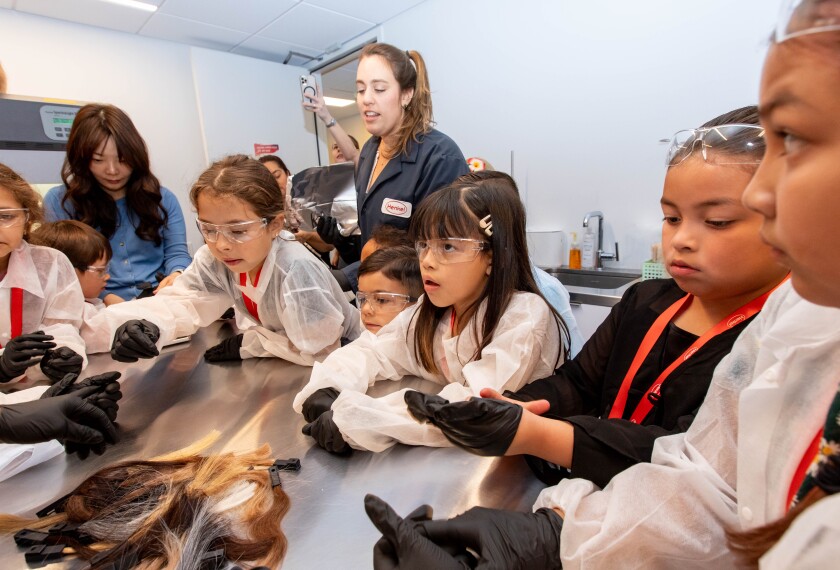The concept of “intelligent design” materialized in the Dover school district only after board members spoke openly about the need to insert Christian religious beliefs into science classes, plaintiffs testified here in a landmark lawsuit.
Those witnesses—all parents of students in the rural, south-central Pennsylvania district—said in their Sept. 27 court testimony that school board members quoted biblical scripture and cited their religious beliefs in public meetings and other settings in explaining their quarrels with the theory of evolution.
Read the related story,
One of the plaintiffs, Bryan Rehm, a parent and former science teacher at Dover High School, testified that board member Alan Bonsell asked science teachers on several occasions to consider teaching creationism alongside evolution. Mr. Rehm claims that Mr. Bonsell made those requests before the district’s intelligent-design policy was approved in October 2004.
“We repeatedly told him, ‘We’re not going to do this,’” testified Mr. Rehm, who now teaches in another district. “It’s not an appropriate decision.”
That testimony emerged on the second day of Kitzmiller v. Dover Area School District, a closely watched case being heard in federal court in Harrisburg. Eleven parents, along with the American Civil Liberties Union and Americans United for Separation of Church and State, are suing the 3,600-student district over its policy to require that students be exposed to intelligent design.
Dover’s school board voted 6-3 last year to rewrite the district’s science curriculum to mandate that students be made aware of “gaps/ problems” in evolution, the widely accepted scientific theory that humans and other living things evolved from common ancestors through the process of natural selection and random mutation. The school board also required that students be made aware of intelligent design, a much-criticized concept positing that evolution cannot explain the development of all living things, and that an unnamed guiding force must have played a role in directing that process.
Board members in Dover later voted to require that their district’s 9th grade biology students be read a statement that introduces the teenagers to the concept of intelligent design. Students have been allowed to opt out of hearing that statement, which also directs them to the pro-intelligent-design textbook Of Pandas and People.
‘Turning Into a Zoo’
Legal observers say the Dover case is the first in the country in which the constitutionality of intelligent design—rather than the biblical belief known as creationism—is facing a court challenge.
The vast majority of scientists say intelligent design is nothing more than religious belief and argue that it has no place in science classes—positions rejected by defenders of that concept. In court this week, the Dover plaintiffs have appeared determined to show that the school board members’ embrace of intelligent design was grounded in religious faith, not sound policy.
In their testimony, the Dover parents each described a series of increasingly rancorous public meetings throughout 2004 in which board members allegedly spoke unreservedly about their Christian beliefs and their skepticism of evolution.
At one such meeting, Mr. Rehm said board member William Buckingham, who has since resigned from the board, described a biology textbook being considered for use in the district as “laced with Darwinism.”
During another public discussion of evolution, Mr. Buckingham made reference to Jesus Christ’s crucifixion and said, “Somebody should stand up for him,” Mr. Rehm testified. He could not recall whether the comments allegedly made by board members occurred at the same meeting or at different ones. In court documents, the defense has denied that Mr. Buckingham made that reference to Jesus.
“It was turning into a zoo,” Mr. Rehm recalled.
Another plaintiff, Aralene D. Callahan, testified that when a Dover High graduate who was in college spoke at a 2004 board meeting about the importance of teaching evolution in preparing students for higher education, Mr. Buckingham told him: “You’re a perfect example of what happens to students when they go to college. They get brainwashed.”
Ms. Callahan, a former school board member, also testified that Mr. Bonsell talked at a private board retreat about the need for evolution and creationism to be taught on a “fifty-fifty” basis in science class.
‘Their Side of the Story’
Outside the Harrisburg courtroom at the end of the day, Mr. Bonsell described much of the plaintiffs’ testimony as “inaccurate” and predicted that a different picture would emerge when the defense presents its case, most likely within two or three weeks. “This is their side of the story,” he said.
“When it all comes out, it’ll be clear this is not religious, it’s educational,” said Mr. Bonsell.
The district’s policy, he argued, puts no pressure on students to accept intelligent design, and no other attempts were made to teach the concept in science class. “This is a one-minute statement,” Mr. Bonsell said of the four-paragraph text approved by the Dover district. “That’s it.”
During his testimony, Mr. Rehm said the board’s policy, and his decision to fight it, has led to friction between him and other members of his otherwise placid community. People on the street regularly call him an “atheist,” among other names, to his face, he said.
Before the controversy, he said, residents saw him as a neighbor. Now, he said, “people know you as a plaintiff.”
But Mr. Bonsell speculated that the harsh words directed at Mr. Rehm by locals were the natural result of something else: the plaintiff’s political ambitions. Mr. Rehm is one of several people who oppose the district’s intelligent-design policy and are running for election to the Dover school board this fall.
“When you’re a candidate,” Mr. Bonsell told reporters at the end of the day, “welcome to politics.”





